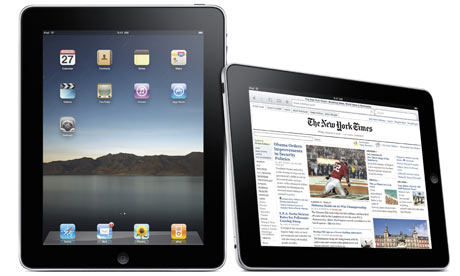Switched On: Tabula rasa
 When Apple introduced the iPod in 2001 -- some 250 million units ago, as Steve Jobs noted -- it began with a laser-like focus on digital music. Swap out a hard drive and FireWire port for a cassette collection, and the product was clearly the reinvention of the Walkman. The first Switched On in 2004 pondered the iPod photo as a stepping stone to video. And by 2007, the iPhone and iPod touch had become capable of playing a broad array of content and would soon be able to extend their capabilities dramatically via apps.
When Apple introduced the iPod in 2001 -- some 250 million units ago, as Steve Jobs noted -- it began with a laser-like focus on digital music. Swap out a hard drive and FireWire port for a cassette collection, and the product was clearly the reinvention of the Walkman. The first Switched On in 2004 pondered the iPod photo as a stepping stone to video. And by 2007, the iPhone and iPod touch had become capable of playing a broad array of content and would soon be able to extend their capabilities dramatically via apps.Nonetheless, while the iPhone and iPod touch were nearly as close cousins as the 3G and non-3G flavors of the iPad, they were each rooted firmly in the existing categories of smartphones and MP3 players and positioned against products in that space. Despite its limited app support, nobody thinks of the Zune HD as a handheld tablet; it's a digital media player that competes against the iPod touch.
No such backdrop exists for the iPad, which will be Apple's most ambitious category-creation initiative since the days of Newton -- Apple's previous large slate device. The iPad, though, varies in its competitiveness versus alternatives. In its favor, its 9.7-inch screen should provide a strong personal entertainment experience for video -- it's a long overdue solid state successor to portable DVD players -- and games, where it's clearly differentiated from smaller-screened Nintendo and Sony devices. It also takes aim at Amazon's Kindle, offering color, backlighting and animation -- but at a higher price, non-free 3G access, and a book selection that won't necessarily appeal to more than those already interested in dedicated e-readers.
As for the browser, its lack of Adobe Flash handicaps its ability to display many Web sites -- notably Hulu, which would greatly enhance its value as, say, an exercise bike fixture. Even Apple's well-rehearsed introduction demonstrations could not avoid the popular plug-in on the Web site of the New York Times. And most of the other bundled apps of the iPad are supersized versions of those that consumers have long enjoyed on Apple's handhelds. While it draws heavily from the iPhone's industrial design, user interface, and developer support, the iPad is a rolling stone, an unapologetic convergence device.
This is why third-party apps will play a much larger role in defining the iPad's identity -- and ultimately, its level of success -- than they have for the iPhone and iPod touch. The iPad represents the other shoe dropping, something we've been waiting for since Apple first introduced iWork for the Mac; the iPad versions are destined to become the MacWrite and MacPaint of Apple's new platform. Another great example was Brushes, the finger-painting app for the iPhone that now turns the iPad into a more credible creative canvas.
And creativity will be key if the iPad is to avoid becoming another in the long line of failed tweener devices. Apple may knock the usability of netbooks as vigorously as their manufacturers bemoan their profitability, but consumers have flocked to them as they are well-understood as small and cheap notebook PCs with all the compromises that entails.
Invoking the history of its event's host city, Apple portrayed the iPad as the next gold rush opportunity. But this time, instead of panning freely from the rushing waters of the iPod's legacy or the iPhone's subsidized ubiquity, developers will have to help Apple dig the riverbed.




 1/31/2010 12:38:00 PM
1/31/2010 12:38:00 PM
 kenmouse
, Posted in
kenmouse
, Posted in
0 Response to "Switched On: Tabula rasa"
Post a Comment
Leave Your Thoughts & We Will Discuss Together